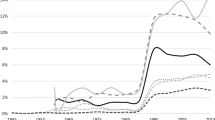Abstract
Many threats society faces are self-engineered, with modifiable behaviors linked to reducing their potential harm for future generations. These challenging issues do not have transparent solutions, because an experimental analysis of behavior has not been functionally applied to larger group units. Mainstream society is a most complex form of group behavior, and single-subject research hides interactivity, but there is a middle ground. Relevant comparisons could be more easily made using smaller experimental communities that thrive by integrating into their ecosystem. This article describes how two behaviorally-inspired experimental communities function as total performance systems and provides suggestions for future analyses.




Similar content being viewed by others
References
Altus, D. E., & Morris, E. K. (2004). BF Skinner's utopian vision: Behind and beyond Walden two. Contemporary Justice Review, 7, 267–286. https://doi.org/10.1080/1028258042000266004.
Braxton, J., Carey, D., Davis, D. W., Footman, A., Flagg, E. W., Grier, L., ... & Kirkcaldy, R. D. (2014). Reported STDs in the United States: 2012 national data for chlamydia, gonorrhea, and syphilis. Center for Disease Control. Retrieved from https://stacks.cdc.gov/view/cdc/21549.
Brethower, D. M. (1982). The total performance system. In R. M. O’Brien, A. M. Dickinson, & M. P. Rosow (Eds.), Industrial behavior modification: A management handbook (pp. 350–369). New York: Pergamon.
Brethower, D. M. (2004). Understanding behavior of organizations to improve behavior in organizations. The Behavior Analyst Today, 5, 170–181. https://doi.org/10.1037/h0100028.
Brown, R. G. (1982). Behavioral science in the design of cultures. (Master's thesis). Retrieved from http://scholarworks.wmich.edu/masters_theses/1708.
Diener, L. H., McGee, H. M., & Miguel, C. F. (2009). An integrated approach for conducting a behavioral systems analysis. Journal of Organizational Behavior Management, 29, 108–135. https://doi.org/10.1080/01608060902874534.
Farrell, A. F., Collier-Meek, M. A., & Pons, S. R. (2013). Embedding positive behavioral interventions and supports in afterschool programs. Beyond Behavior, 23(1), 38–45.
Flanigan, J. (2013). The use and evolution of gender neutral language in an intentional community. Women and Language, 36(1), 27–41.
Frederiksen, L. W., Riley, A. W., & Myers, J. B. (1985). Matching technology and organizational structure: A case study in white collar productivity improvement. Journal of Organizational Behavior Management, 6, 59–80. https://doi.org/10.1080/J075v06n03_05.
Hayes, L. J., Dubuque, E. M., Fryling, M. J., & Pritchard, J. K. (2009). A behavioral systems analysis of behavior analysis as a scientific system. Journal of Organizational Behavior Management, 29, 315–332. https://doi.org/10.1080/01608060903092169.
Johnson, D. A., Casella, S. E., McGee, H., & Lee, S. C. (2014). The use and validation of preintervention diagnostic tools in organizational behavior management. Journal of Organizational Behavior Management, 34, 104–121. https://doi.org/10.1080/01608061.2014.914009.
Kaplan, B. A., Gelino, B. W., & Reed, D. D. (2018). A behavioral economic approach to green consumerism: Demand for reusable shopping bags. Behavior and Social Issues, 27, 20–30.
Kinkade, K. (1973). A Walden two experiment: The first 5 years of twin oaks community. New York: William Morrow & Company, Inc.
Knaup, A. E., & Piazza, M. C. (2007). Business employment dynamics data: Survival and longevity, II. Monthly Labor Review, 130(9), 3.
Kriesen, G. L. (2011). Print still matters in an e-learning world, and training companies need to properly manage it. Journal of Organizational Behavior Management, 31, 179–195. https://doi.org/10.1080/01608061.2011.589721.
Kuhlmann, H. (2000). The illusion of permanence: Work motivation and membership turnover at twin oaks community. Critical Review of International Social and Political Philosophy, 3, 157–171. https://doi.org/10.1080/13698230008403318.
Kuhlmann, H. (2005). Living Walden two: B.F. Skinner’s behaviorist utopia and experimental communities. Chicago: University of Illinois Press.
Kuhlmann, H. (2012). Interview with Roger Ulrich. In D. Iazzetto (Ed.), Toward living well with less (pp. 162–175). Kalamazoo: Behavior Development Corp.
Lake Village Homestead. (n.d.-a). School farm to table Program Retrieved from http://www.lakevillagehomestead.org/education.
Lake Village Homestead. (n.d.-b). Support our programs. Retrieved from http://www.lakevillagehomestead.org/.
Lake Village Homestead. (n.d.-c). Welcome to Lake Village Homestead. Retrieved from http://www.lakevillagehomestead.org/.
Mattaini, M. A. (1991). Walden 1.9: Successive approximations. Behavior and Social Issues, 1, 1–8. https://doi.org/10.5210/bsi.v1i2.167.
McGee, H. M. (2007). An introduction to behavioral systems analysis for OBMers and non-OBMers alike. OBM Network Newsletter, 21(2).
McSween, T. (1995). The values-based safety process: Improving your safety culture with a behavioral approach. New York: Van Nostrand Reinhold.
Michael, J. (2004). Historical antecedents of behavior analysis. In Concepts & Principles of Behavior Analysis (pp. 93–104). Kalamazoo: Association for Behavior Analysis International.
National Secondary Transition Technical Assistance Center. (2009). Transition institute toolkit. Kalamazoo, MI: Career Connections Research Center. Retrieved from https://transitionta.org/system/files/toolkitinstitute/Paper_InstituteTK2nd.pdf?file=1&type=node&id=1358.
O'Connor, R. T., Lerman, D. C., Fritz, J. N., & Hodde, H. B. (2010). Effects of number and location of bins on plastic recycling at a university. Journal of Applied Behavior Analysis, 43, 711–715. https://doi.org/10.1901/jaba.2010.43-711.
Pawson, R. (2002). Evidence-based policy: In search of a method. Evaluation, 8, 157–181. https://doi.org/10.1177/1358902002008002512.
Performance Blueprints, Inc. (2014). Organizational mapping & diagnostics tool. Retrieved December 11, 2014, from http://courses.performanceblueprints.com/courses/organizational-analysis-tool.
Ramanathan, V., & Feng, Y. (2009). Air pollution, greenhouse gases and climate change: Global and regional perspectives. Atmospheric Environment, 43, 37–50. https://doi.org/10.1016/j.atmosenv.2008.09.063.
Rothschild, J., & Tomchin, A. (2006). Can collectivist-democracy bring gender equality? The efforts at Twin Oaks. Research in the Sociology of Work, 16, 239–262. https://doi.org/10.1016/S0277-2833(06)16009-4.
Rummler, G., & Brache, A. (1995). Improving performance: How to manage the white space on the organization chart (2nd ed.). San Francisco: Jossey-Bass Publishers.
Truman, J. L., & Langton, L. (2015). Criminal Victimization, 2014. Retrieved from https://www.bjs.gov/content/pub/pdf/cv14.pdf.
Twin Oaks Community. (n.d.-a). Bylaws. Retrieved from https://www.twinoaks.org/policies/bylaws.
Twin Oaks Community. (n.d.-b). Income-sharing. Retrieved from http://www.twinoaks.org/frequently-asked-questions-faqs-85.
Twin Oaks Community. (n.d.-c). Public events. Retrieved from https://www.twinoaks.org/events.
U.S. Department of Labor, Bureau of Labor Statistics. (n.d.). Table 7: Survival of private sector establishments by opening year. Retrieved May 27, 2017, from https://www.bls.gov/bdm/us_age_naics_00_table7.txt.
World Health Organization. (2014). Promoting health while mitigating climate change. Technical briefing for the World Health Organization conference on health and climate discussion draft. Retrieved from http://www.who.int/phe/climate/conference_briefing_2_promotinghealth_27aug.pdf.
Author information
Authors and Affiliations
Corresponding author
Ethics declarations
Conflict of Interest
The first author resided at Lake Village Homestead Farm for about 2 years.
Rights and permissions
About this article
Cite this article
Molina, B., Deochand, N. & McGee, H. Learning from Experimental Communities Using Behavioral Systems Analysis. Behav. Soc. Iss. 28, 174–188 (2019). https://doi.org/10.1007/s42822-019-00005-y
Published:
Issue Date:
DOI: https://doi.org/10.1007/s42822-019-00005-y




